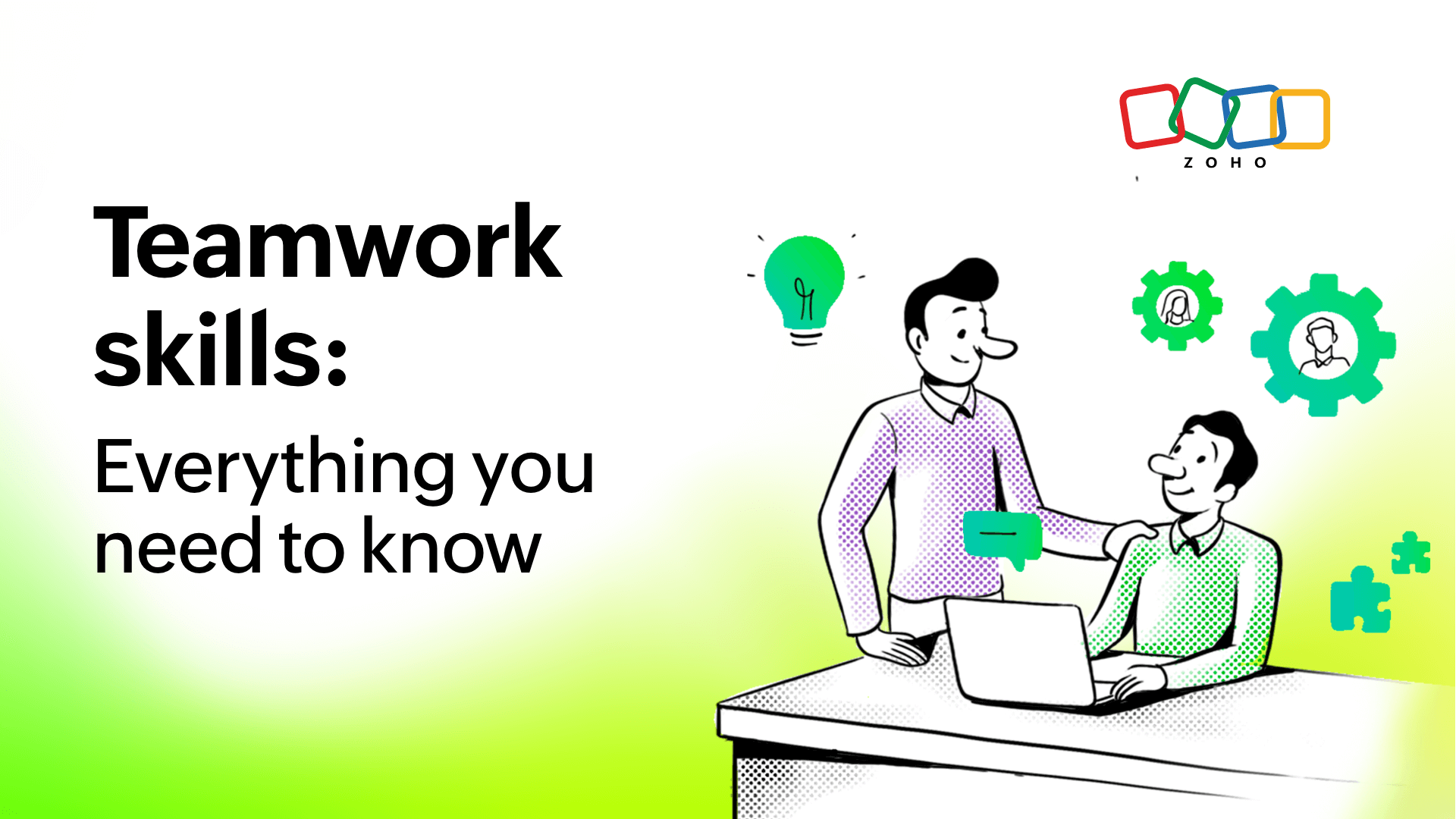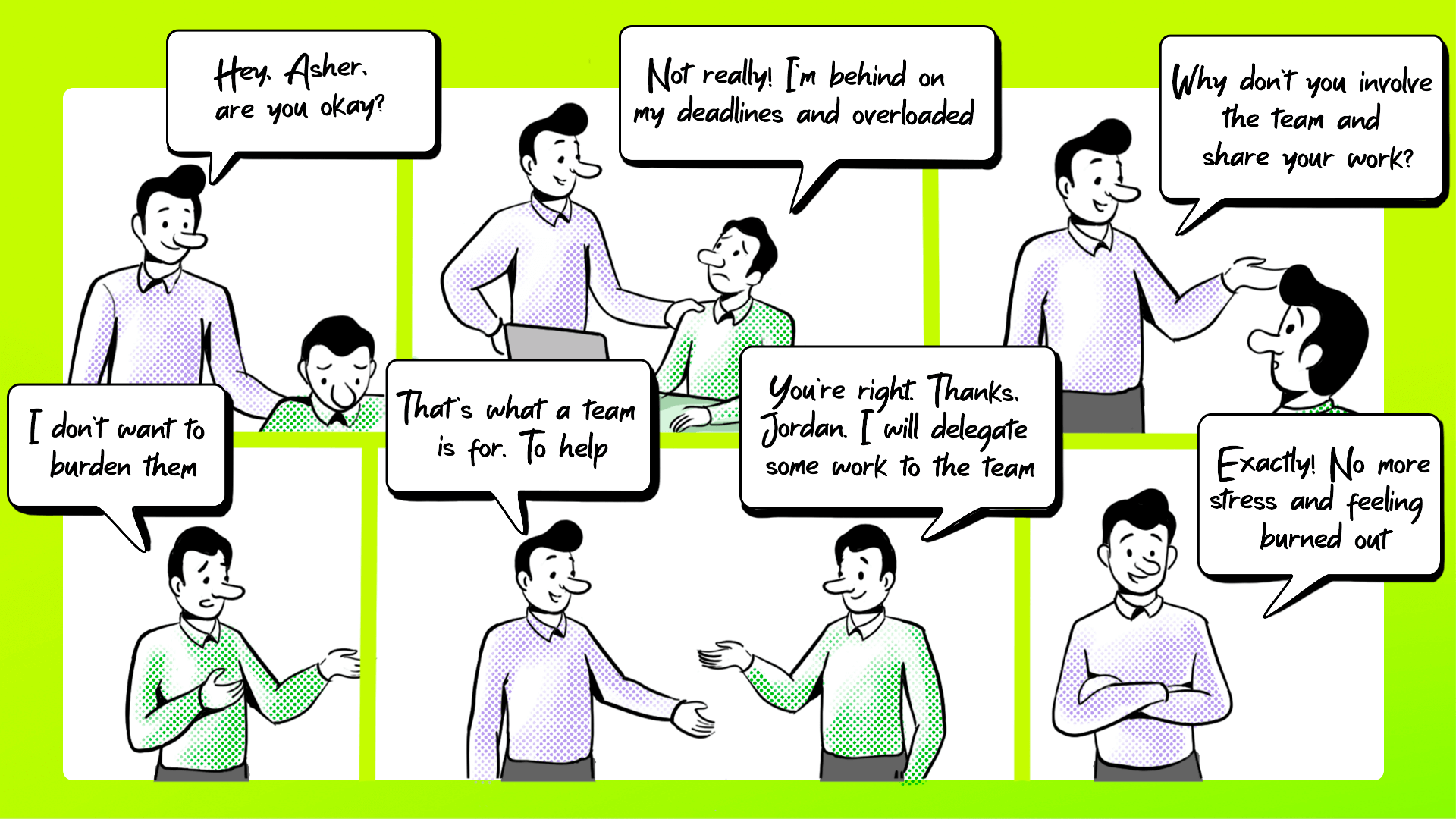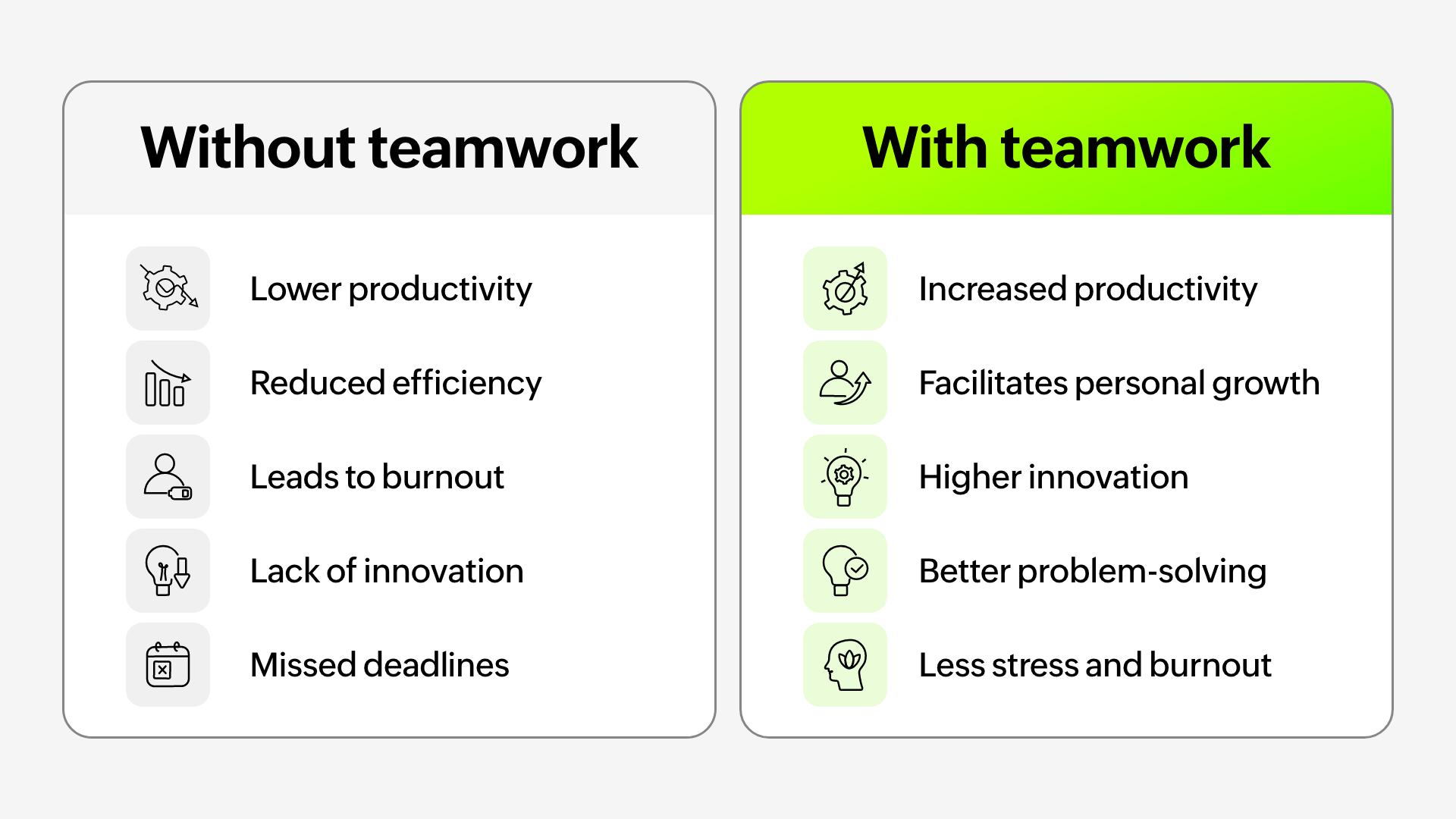- HOME
- All Products
- Collaboration
- Teamwork skills: everything you need to know
Teamwork skills: everything you need to know
- Published : July 31, 2024
- Last Updated : March 19, 2025
- 1.8K Views
- 9 Min Read

The phrase "teamwork makes the dream work" emphasizes the potency of combined team effort. This is where you share responsibility, divide tasks, and convert dreams into reality. The essence of teamwork is coming together as a team and working towards a common goal, all while keeping everyone motivated.
Let's dive deep into this concept and understand the nuances of teamwork skills. Improving this skill can do wonders for your workplace efficiency.
Why do you need teamwork?

Ever wondered about the marvel of the pyramids of Giza? Even before the advent of modern construction tools, people could build such wonders.
The secret behind this? Teamwork. A team that works together wins together.
Check out how teamwork can help you in your workplace to be more productive and ruthless in completing tasks before the deadline.
It allows new ideas to flourish
A lone wolf working on a project can run out of ideas and struggle with inspiration. Teamwork directly mitigates this state of being stuck by bringing people of varying ideas together. Bouncing ideas off each other will result in innovative new ideas that can drive the project forward.
It increases productivity
A group of people working on a task can significantly reduce the amount of time it takes to complete it compared to a single person slogging through it. With delegation and collaboration within your team, you can see your output increase by several-fold.
It facilitates problem-solving
Problems are part of any project you undertake—some easy, some impossible to solve. You can either scratch your head looking for a solution by yourself, or seek the power of teamwork and bring creative people into the mix. Open discussions as a team can clear any blocks and decrease the time needed to fix a problem.
It paves the way for personal growth
Teamwork can easily influence your personal growth positively. You can pick up new skills from your teammates with different experiences. You may have blind spots in your life, and that can hold you back. However, constructive feedback from your team can shine a light on areas where you can improve and elevate your personal growth.
It promotes company culture
Every company yearns for a positive outlook on their company culture. Teamwork comes in handy here. When you're working as a team, you’ll form a strong camaraderie with your colleagues. This translates to a vibrant workforce that pushes each other to do better and makes sure outstanding employees are appreciated.
What are teamwork skills, and which ones should you develop?
Teamwork is not a gimmick that guarantees great results. There are a lot of moving parts that make teamwork churn out amazing outputs. Let's explore the different teamwork skills you need to acquire to produce elite-level output in your work.
Open communication
This skill is the most important for teamwork to be successful. There's no good in withholding information from your team. They’ll be left in the dark about the problems you might be facing, leading to missed deadlines. This is why communication is vital.
The art of effective communication with your team leads to enhanced collaboration and fosters a culture of being heard. Communication also keeps your team members on the same page while leaving no room for conflicts.
Actionable tips
Encourage team members to be open.
Be receptive to the input of others.
Avoid over-communication at all costs.
Being empathetic
Cutting off a person while they’re talking will be frustrating for them. A lack of empathy and active listening can tank the morale of the entire team by discouraging inputs from others.
For teamwork to flourish, empathy is another crucial skill to practice. A team will be diverse, with people who have unique views. Being empathic to their inputs and engaging in active listening could yield amazing results and enhance team bonding.
Actionable tips
Take genuine interest in your team and their interests.
Don't react negatively in a challenging situation.
Frame your feedback as guidance and not as veiled criticism.
Trusting others
Imagine a gardener who digs up a seed he’s planted every day to check on its progress. Even though his intentions are good, he ends up hindering the growth of that plant by bothering it constantly. This is the same outcome of micromanagement in your team.
A lack of trust is detrimental to creating a high-flying team. Without this teamwork skill, there’s no collaboration—just a group of people coming together and working by themselves.
This is why you shouldn’t develop a culture of micromanagement within your team. Instead, learn to cultivate the skill of trusting others to do their jobs. This will raise your team’s confidence levels and increase their creativity.
Actionable tips
Don't go overboard with micromanagement.
Give your team a certain level of freedom to ensure a free flow of ideas.
Admit when a mistake is made to gain the trust of your peers.
Delegating load
Another teamwork skill that can guarantee amazing results is delegation. Teamwork is not a one-man show. This can only cause burnout, feelings of being overloaded, and missed deadlines.
Instead, you can delegate work and share responsibilities, which will help you take some weight off your shoulders. But always be mindful of your teammate's bandwidth before delegating tasks to them. The crux here is an even distribution of workload.
Actionable tips
Avoid carrying all of the workload by yourself.
Strive for an even distribution of workload within your team and allocate resources efficiently.
Give credit when it's due for a job well done.
Resolving conflicts
During teamwork, conflicts are almost guaranteed. Different people with differing views will certainly rub some people the wrong way, causing uneasiness. But, with proper conflict resolution skills, you can turn this unpleasantness into an emotional growth opportunity for your team.
If you’re a diverse team of people, conflict resolution skills are a must for you. With this teamwork skill, you can judge the situation based on facts, logic, and personal feelings and arrive at a compromise that sits well with everyone in your team. Conflict resolution results in an outcome that doesn't disrupt the rhythm of your team.
Actionable tips
Don't react emotionally to a work-related conflict.
Focus on the solution, not the person.
Try to find common ground when you can't agree with each other.
Leadership capability
We're in an era that preaches following the herd and cherishes going with the flow. But, to shine in this era, develop a flair for leading your team—during both highs and lows. Leadership is a crucial teamwork skill that can help you go the distance anywhere.
Instead of being a leader who stands tall and shouts orders, develop the trait of being hands-on and guide your team towards the common goal by clearing any blocks they might encounter. Being a leader also comes with keeping the morale of your team high when things go south and appreciating top-performing team members.
Actionable tips
Lead by example and set the standard you want from your team.
Maintain a positive atmosphere within your team.
Provide timely feedback and help people grow.

A real-life example of teamwork success
Do you wonder if the different teamwork skills we've discussed above can be considered practical in the real world? The answer to this question comes from a company that is revolutionizing the EV car market: Tesla.
When talking about Tesla’s success stories, on the surface level, it may seem like the sole person driving it is Elon Musk. But if we delve a little deeper, we can find out that it all boils down to solid teamwork in action.
Achievements of Tesla’s product development team
With a mission-driven approach, effective collaboration, and the ability to take risks and count on each other, the product development team at Tesla was able to make some serious progress even when the path on their roadmap seemed rocky.
Below are some of their major achievements.
1. Development of revolutionary electric vehicles
When Tesla started out, no one thought that mass production of electric cars was feasible. But the product development team, with people from varying fields, such as engineers, designers, marketers, and software developers, made it a reality.
2. Full self-driving technology (FSD)
There are still miles to go in the pursuit of making this technology fully autonomous. But even in this state, the FSD technology developed by the team at Tesla is nothing short of impressive. This technology allows Tesla vehicles to drive and park by themselves and can even detect traffic lights and read stop signs.
3. Supercharger network
Electric vehicles (EVs) don't run on conventional gas and must be charged at specialized charging stations. The product development team identified the need to establish a network of chargers worldwide and brought it to fruition. Now, long-distance commutes in EV can be done without range anxiety.
What drives the product development team at Tesla?
The achievements of Tesla and the massive strides they've taken towards building the most valuable car company in the world cannot be downplayed. But what actually keeps their teamwork a smooth ride? Let's find out.
1. Transparency and open communication
For a company to have an impact of this magnitude in the EV market, a strong collaboration game is a must. The product development team at Tesla prioritized transparency and sound communication, which let them set clear-cut goals and resolve any blocks proactively. The result was a revolutionary automobile business.
2. Leadership and a clear vision
Tesla follows a flat hierarchy, and the leadership here empowers people to make many decisions on their own. This inherently provides a place for innovative ideas to flourish. They set clear visions for their team to work on and to create world-class products.
3. Learning and constant development
Iteration and innovation are crucial for Tesla to be ahead of the curve in this competitive automobile industry. Their team is no slouch in this aspect, either. A hunger to create the next big thing drives them to seek innovative ideas and engage in productive brainstorming sessions within their team.
How can you improve your teamwork skills?
Now that we've seen the impact of teamwork skills, let's explore the different ways you can improve yours.
Be a problem solver
Problems are a part of everyday life and certainly a part of every team. It can range anywhere from facing a difficult phase in your project to disagreements within your team. This is why problem-solving is a transformative teamwork skill you should have.
Being able to locate the source of the problem and tackle it head-on can establish you as a positive influence on your team. This also opens up doors for collaboration within your team to ensure that everyone's on the same page.
Appreciate different ideologies
Multiple ideas taking shape to facilitate an amazing outcome are at the heart of teamwork. This is also where a lot of differences of opinion come into play. You may not be entirely sold on the ideas of your team members. But learning to appreciate different ideologies is key to unlocking breathtaking results.
Always stay respectful of the different ideas that your team members bring to the table. This can also help you grow as a professional in your career because different ideas translate to new learning, and new ideas push the boundaries of excellence.
Be objective, not emotional
Conflict is a natural part of any team. But keeping a cool head and reacting to a conflict with objectivity is vital to keeping your team’s morale up. Whenever a difference of opinion arises, don’t take it to heart and react emotionally. This can only escalate tensions further.
Instead, keep your focus on the team's goals and make sure you’re driven by facts. This can alleviate the tension and make it easier for the other side to find common ground. Being objective also paints you as a more reliable person within your team.
Avoid overbearing on others
Micromanagement kills productivity and buries creativity within any team. It may seem like a good thing to have oversight of what your team is up to because you can catch mistakes and course-correct them proactively. But this runs the risk of stifling creative freedom when someone is watching over their shoulders every step of the way.
Allow creative freedom within your team and be receptive to others' contributions. Don't rush to intervene unless others ask for your help. Autonomy drives innovation within a team. So delegate, set clear expectations, and trust the person to complete the task.
Summing up
There’s no substitute for teamwork, and teamwork skills are crucial in almost every field. Effective teamwork can efficiently solve the most complex of tasks. Implement the above techniques to improve your teamwork skills and use this power of unity to your advantage.
Always be a team player, maintain good communication, and always strive towards creating a positive environment within your team by resolving conflicts as they arise.
 Rohan
RohanRohan Samuel is a product marketer for Zoho Workplace who talks about workplace security, productivity, and collaboration. He is a highly enthusiastic writer who delights in evoking visual imagination with words. He also enjoys playing football with his buddies and traveling to new places.


